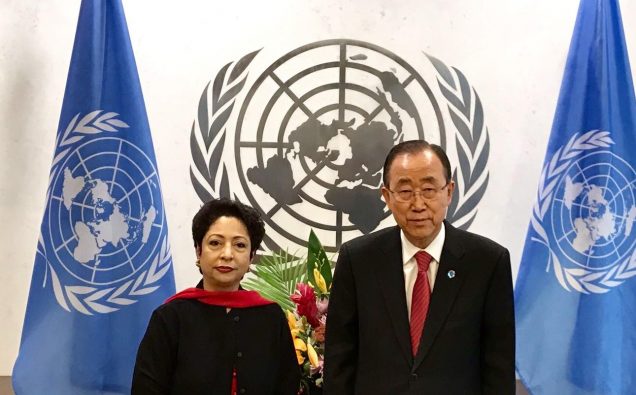
UN Secretary-General Ban Ki-moon has called for urgent deescalation of tensions between India and Pakistan and an end to violence in the region.
The UN chief made that call during a meeting with Pakistan’s UN Ambassador Maleeha Lodhi, held in his 38-floor office at UN Headquarters in New York.
According to the Pakistani Mission, the secretary-general said he was saddened by the loss of life of two Pakistani soldiers and he extended condolences to the Government of Pakistan and the family of the deceased.
Briefing him about the escalating situation, Ambassador Lodhi said that India has, by its declarations and actions, created conditions that pose an imminent threat to regional and International peace and security. She also told the secretary-general, that while India’s claim of carrying out a surgical strike across the Line of Control was false, India had by its own admission, committed aggression against Pakistan.
Dr. Lodhi said India has provoked this crisis to divert international attention away from the indigenous Kashmiri uprising against Indian occupation. It was, therefore essential to address the root cause of this crisis – India’s continuing denial of the right of self determination to the Kashmiri people. In this regard, she asked the secretary-general to play a role in bringing an end to the grave human rights.
Responding to the detailed briefing, the secretary -general repeated his offer of extending his good offices to both countries, which Pakistan has always welcomed but India has consistently declined, a statement by Pakistan’s Mission to the UN said.
Ban Ki-moon regretted the fact that UNMOGIP (United Nations Military Observer Group in India and Pakistan) was unable to fully function due to India’s non-cooperation. The UN’s military Mission is only able to operate on the Pakistani controlled side of the LoC as India refuses to accept its functioning on the other side and opposes its expansion.
Nevertheless, Ambassador Lodhi asked the secretary-general to ensure that UNMOGIP is able to report independently about the facts of the situation on the ground to the Security Council.
Ambassador Lodhi told the secretary-general that Pakistan has exercised maximum restraint but would respond forcefully to any acts of aggression and provocation. She added that the responsibility for the escalating crisis rests entirely on India.
The UN chief also conveyed his dismay at the cancellation of the SAARC summit saying this could have been a good opportunity for dialogue.
The Pakistani diplomat told the secretary-general that the international community, and especially the United Nations, should not ignore this grave threat to international peace and security with possibly catastrophic consequences for the entire region. She urged Ban to intervene “boldly and unequivocally” by calling on India to halt its aggressive actions and provocations, lest these lead to an even more dangerous situation. She said that the secretary-general is duty bound to do so under the UN Charter.
If India did not heed this call, she said, the UN’s relevant mechanisms, including the Security Council, must be advised of this imminent threat to international peace and security, as required under the UN Charter.
On Thursday, soon after the reports came in of Indian aggressive acts in the disputed Kashmir region, Ambassador Lodhi met with the President of UN Security Council, Gerard van Bohemen of New Zealand, and briefed him on the escalating tensions with India.
“I brought to his attention the dangerous situation that is building up in our region as a result of Indian provocation,” Ambassador Lodhi told reporters, adding, “Our call to the international community is avert a crisis before there is one.”
Pakistan, she said, will not be drawn into a conflict but, “we will be ready to respond if India decides to provoke and action that is across the border.”













